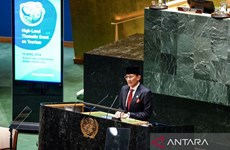Thailand, Malaysia support peaceful East Sea dispute settlement
Thai Prime Minister stressed the importance of maintaining stability in the Asia-Pacific region while affirming his full support for peaceful solutions to regional tensions, including East Sea dispute
 Thai Prime Minister Prayut Chan-o-cha (Photo: Xinhua/VNA)
Thai Prime Minister Prayut Chan-o-cha (Photo: Xinhua/VNA)Bangkok (VNA) – Thai Prime Minister Prayut Chan-o-cha on February 16 stressed the importance of maintaining stability in the Asia-Pacific region while affirming his full support for the international community in seeking peaceful solutions to regional tensions, including East Sea dispute.
Speaking at a working dinner on the “Regional Strategic Outlook” during the Special ASEAN-US Summit in Sunnylands, California, the Thai leader highlighted that East Sea dispute is an exceedingly sensitive issue that has critical impacts on geopolitics, economy and international cooperation.
He said that it should be resolved with prudence and right approach to ensure peace, stability and development in the region.
Thailand will back efforts to assure freedom and safety of navigation and aviation as well as international trade and travel in the area, he affirmed.
The Thai premier underscored that the Declaration on the Conduct of Parties in the East Sea (DOC) is a useful mechanism to maintain trust among relevant sides and bring about peaceful solutions to the East Sea issue. He called on concerned parties to follow the DOC and push up negotiations on drafting a legally binding code of conduct (COC).
He hailed the US role in supporting ASEAN member states in finding peaceful measures to address the East Sea issue, promote freedom of navigation and overflight, and speed up negotiations on the COC.
Meanwhile, Malaysian Prime Minister Najib Razak said that ASEAN leaders have reiterated their stance on peaceful solutions to sovereignty disputes in the East Sea.
All parties must exercise self-restraint, avoid increasing tensions in the area, he told Malaysian press on February 16, adding that they should respect the DOC signed between ASEAN and China in 2002, paving way for mapping out the COC- a guideline to prevent conflict in the region.
Malaysia asserts that East Sea dispute should be tackled through negotiations and international law, including the 1982 UN Convention of the Law of the Sea (UNCLOS).-VNA













